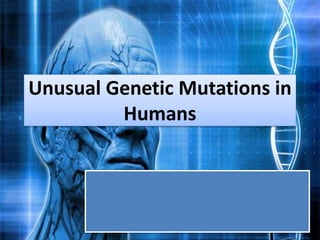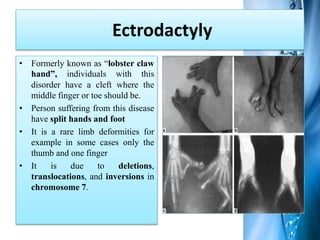Unusual genetic mutations in human
- 1. Unusual Genetic Mutations in Humans
- 2. PROGERIA ŌĆó Severe genetic disorder that causes accelerated aging. ŌĆó Mostly children die at age 13. ŌĆó Death is typically caused by a heart attack or stroke. ŌĆó It affects as few as one per eight million live births. ŌĆó The disease is caused by a mutation in the LMNA gene (limb-girdle muscular dystrophy), a gene that provides support to the nucleus.
- 3. Uner Tan Syndrome ŌĆó People who suffer from it walk on all fours. ŌĆó These individuals walk with a quadrupedal locomotion, use primitive speech, and have a congenital brain impairment.
- 4. Hypertrichosis ŌĆó It is also called ŌĆ£werewolf syndromeŌĆØ ŌĆó and it affects as few as one in a billion people ŌĆó only 50 cases have been documented since the Middle Ages. ŌĆó People with hypertrichosis have excessive hair on the shoulders, face, and ears. ŌĆó Studies have implicated it to a rearrangement of chromosome 8. ŌĆó It happens due to a disruption of the ŌĆ£crosstalkŌĆØ between the epidermis and the dermis as hair follicles form in the 3-month fetus at the eyebrows and down to the toes.
- 5. Epidermodysplasia Verruciformis ŌĆó Epidermodysplasia verruciformis is an extremely rare disorder that makes people prone to widespread human papillomavirus (HPV) infection. ŌĆó This infection causes scaly macules and papules to grow on the hands, feet, and even face. ŌĆó These skin ŌĆ£eruptionsŌĆØ appear as wart-like lesions and even wood-like and horn-like growths with reddish- brown pigmented plaques ŌĆó The skin tumors start to emerge in people between the age of 20 and 40, and the growths tend to appear on areas exposed to the sun. ŌĆó These warts can removed by surgery.
- 6. Severe Combined Immunodeficiency Disorder (SCID) ŌĆó Also known as the Boy in the Bubble Disease, itŌĆÖs a disorder in which individuals are born without an effective immune system. ŌĆó a boy name Vetter lived in plastic bag for 13 years, to protect him from exposure to life threatening pathogen but he died in 1984 due to an unsuccessful bone marrow transplant ŌĆó This disorder is caused by a number of genes, including those that cause defects in both T and B cell responses ŌĆó SCID is also thought to arise due to the lack of adenosine deaminase (ADA). ŌĆó SCID can be treated by Gene Therapy.
- 7. LeschŌĆōNyhan Syndrome ŌĆó Genetic disorder that affects one in every 380,000 births, nearly all of them boys. ŌĆó An overproduction of uric acid ŌĆó Person suffering from this disease release excess uric acid through their blood which builds up under the skin causing gouty arthritis. ŌĆó It can also cause kidney and bladder stones. ŌĆó The disease also affects neurological function and behavior.
- 8. Ectrodactyly ŌĆó Formerly known as ŌĆ£lobster claw handŌĆØ, individuals with this disorder have a cleft where the middle finger or toe should be. ŌĆó Person suffering from this disease have split hands and foot ŌĆó It is a rare limb deformities for example in some cases only the thumb and one finger ŌĆó It is due to deletions, translocations, and inversions in chromosome 7.
Editor's Notes
- Gout is a kind of arthritis. It can cause an attack of sudden burning pain, stiffness, and swelling in a joint, usually a big toe. These attacks can happen over and over unless gout is treated.










